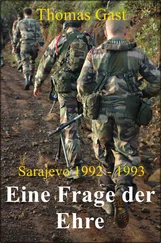Eight years ago Davor went camping with the scouts near Lake Boračko. It was part of an exam to become a Scout-Partisan. He and six other boys were not supposed to talk all day. They had to spend the night in the woods and cross the hanging bridge over the Neretva. The following day the other six returned but Davor was nowhere to be found. The whole camp began to search for him. They alerted the police in Konjic. The phone rang in the flat, and a man’s voice asked various questions about Davor. Did he show any signs of pathological fear? Was he afraid of the dark when he was little? How did he cope with loneliness? The father gave hysterical answers. The mother and sisters grew pale; it was chaos. That night Davor was found in the wood near Glavatičevo. He was laughing and pointing at something. When the scout leader gave him permission to speak, he calmly said that he had got lost because, unlike those six cheats, he had decided to become a real Scout-Partisan and cross the bridge. The next day the camp was over. The tents were folded, and only the regular geometrical patterns of dry grass and the scorched traces of the camp fires remained.
At midnight the older woman poured more oil into the glass and the flame crackled briefly. Once again the man fixed the wires to the battery. This time a woman’s voice reiterated the same news. The pounding became more syncopated. Regular waves of explosions covered the city from one end to the other. There was a sound like a cat scraping its claws on glass, very quiet at first but getting louder — it had started to rain.
The younger woman went over to the window and pressed her hand against the pane. “It looks like a real spring shower,” she said, “and yet by morning it will have turned to snow. It didn’t rain when it should have, so it has to now. There’s no winter without snow; you keep on hoping it won’t come this year, but it arrives with the first cherry blossom.”
She walked into the bathroom and picked up two aluminum bowls, then she went out into the rain. When she came back her hair was covered in droplets of water that shimmered like quicksilver in the candlelight. The water had a rather solid appearance, as though a gentle hand could have gathered up all the drops. Soon a different noise came from outside; it was the metallic sound of water pouring out of the drainpipes into the bowls.
The older woman held the now-forgotten bottle of oil between her knees. She looked down and saw that her dress was covered in grease marks.
She said, “You boarded up all the windows, there isn’t a glimmer of light in the room. Others light their candles at nine; we have to light ours at six. You’ll rot in this darkness.”
The man looked at her, clenching his right hand into a fist and raising it in front of his face as if he were about to scream. He jerked his hand open, drummed on the table with his fingers, then stood up and left the room. At first they just heard the sound of branches breaking and wet leaves fluttering, but soon it was possible to hear the man taking the boards off the windows and pulling down the sandbags, which landed with a dull thud on the ground. The sand went everywhere.
“Happy now?” cried the man.
The older woman sighed. The younger one nervously slapped her knees. The man came back into the room without a word, sat down on the bed and lit another cigarette. The two women also lit up at that moment. According to the house rule, they were only allowed two cigarettes each per day. They were already over the limit.
In the early days of the war Davor told his parents that he wanted to join the Territorial Army. His mother could never sleep while he was absent on duty. Her husband used to scold her, and so she always had a terrible migraine the following day. Usually Davor came back from military duty with a smile on his face, only to spend hours regaling the younger woman with stories of his exploits in the war zone. Of course he used to exaggerate slightly, making up jokes about himself as well as the Chetniks. Yet it seemed that in his bizarre, war-engendered happiness, he was unlikely to come to any harm. The man always hugged his “brave son” and interrupted with a story of his own — how in 1953, somewhere near Pirot, or somewhere even more remote perhaps, he was among half a dozen recruits who were ambushed by Bulgarian border guards.
The young woman was the first to fall asleep. She curled up in the armchair like a fetus. The man covered her with a large Russian scarf and stroked her hair. The older woman took a bottle of transparent liquid from the cupboard and poured the contents into two coffee jugs, but very quietly, to avoid knocking the neck of the bottle against the rim, because the sound was likely to wake the sleeping woman. Afterwards she sat in the middle of the room scraping bits of wax off the bottle with her fingernail. The man stared absent-mindedly into the black mirror of the windowpane.
“Perhaps he couldn’t get back because the sniper was shooting at the bridge,” she whispered at last.
The man shrugged his shoulders and continued to stare at the glass. His wife watched him hopefully or pleadingly for a matter of seconds, then stood up and went to the bathroom. Outside, in the dark, there was an explosion not very far away. The sleeping woman awoke with a jerk. She smiled. The man looked at her and the smile lingering on her face. It remained for several minutes like the expression of a wax figure. At first the smile looked warm and friendly, but it changed and soon became insanely frightening. The man’s gaze returned to his self-portrait in the window.
The older woman stretched out on the sofa, whose springs played a few notes. She turned over to face the wall and didn’t move again. After a while her breathing became regular and maintained its steady rhythm until dawn.
The man left the room on tiptoe, stopping to pick up another cigarette and the lighter on his way out. He stood under the eaves; it was no longer raining; the wind shook the raindrops from the trees. The man believed that the winter might really pass without snow. He lit a cigarette, inhaled and remembered that silly adage about not smoking outdoors at night, because a soldier could easily mistake the cigarette for the infrared sight of a sniper’s gun. The bombing had stopped. Several minutes would elapse before a melancholy watchman discharged a round of machine-gun fire. The shots sounded rather inoffensive but not very far away. It was a reminder that not everybody was asleep. There were still people with mad, unhappy and worrying thoughts who were on duty. The cigarette had burned down to his fingers as the man threw a last glance at the sun rising over the hills. He closed the door behind him and went back into the room. Everything was just as he’d left it. He lay down on the bed and closed his eyes.
The man and the two women were asleep when the bright daylight streamed into the room for the first time in ten months. They were like children in a hospital ward struggling not to wake up.
You could spend your whole life searching around Bosnia and not come across another person who was so evil. He was moody and he wore an expression of such disgust that nobody would look him in the eye in case he made something of it. On one occasion a boy was kicking a football against this man’s house. Jovan, alias Musa, opened the door and hissed, “Get away from here.” When the boy refused to stop, Jovan ripped off one of his fingers. The boy’s father shrugged his shoulders. “What can you do?” everybody said. “That’s Musa for you.” And it didn’t even occur to them to look at the culprit reprovingly. Whenever he got drunk, the villagers hid in their homes, because he’d prowl around the village like a rabid dog, shouting: “I’ll show you. I’m gonna skin you alive!” When he was ranting like this, he used to beat the shit out of anyone who accidentally got in his way. He wasn’t discriminating — he’d beat up a relative just as soon as a total stranger. If your travels brought you to the village of D—, the well-meaning villagers made sure to warn you about Musa as if declaring the risk of a natural disaster. If it had been possible, the local people would probably have signposted a warning at the entrance to the village.
Читать дальше










